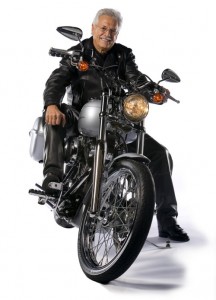A 75-year-old professor who rides a Harley is unforgettable for most students.
Lipscomb’s psychology department proudly claims that unique motorcycle-collecting faculty member in Dr. Roy Hamley.
Hamley, one of the three self-titled “psycle therapists,” rides with his colleagues Dr. Shanna Ray and Dr. Jake Morris on weekends in the spring and fall when the weather is nice.
After his son and daughter both bought Harleys, Hamley, who currently has four motorcycles, decided he should join the excitement and live “full throttle.”
“I thought if they’re having all that fun, I’m going to find out what I’m missing,” he said. “So, I’ve been riding about 20 years, and I should have started sooner. I wasted a half a century before I started.”
Morris and Ray began riding two years ago, after they took a motorcycle safety course together.
More than half of the professors in the psychology department ride motorcycles, and those in the department who don’t ride enjoy teasing those who do.

Ray said she heard that Dr. Paul Turner, one of her colleagues, was “talking trash.”
“He has a bicycle,” she explained, “and he was telling his classes that he’s the only real biker in the department. He was making out like we’re a bunch of sissies who sit there and twist throttle, and you know, he actually has to work.”
Ray noted, with a laugh, that the only time she and Morris argue is when they’re disputing who should take the lead when they’re on their bikes. Morris agreed, explaining the two get along well at work.
“When we get on our bikes and you’re ahead of me, that’s when it happens,” Ray said. “We just learned not to do that any more, not to have him ahead of me. I either need to lead, and you just be back there feeling like we need to go twice as fast as we are but keep it to yourself. Or put him in charge, and we’ll just trail him.”
Morris said the three friends each have their own distinct style.
“Dr. Ray is coordinated,” he explained. “She’ll wear her pink helmet and her pink leather jacket. Everything matches. I tend to be a little more of a yuppy biker. I’ve got a brown leather jacket, and I’ll wear blue jeans or khakis and tennis shoes. Dr. Hamley looks like a bad boy. He’s got leather pants, tattoos… I mean, he’s a bad man.”
Hamley smiled, and Ray joined in, offering a little insight into her clothing choices.
“I enjoy doing masculine things in a distinctively feminine way,” she said. “So, I’ll ride a motorcycle as long as it’s pink or purple.”
Without hesitation, Morris jumped in to say that Ray has her handgun permit and carries a pink .38 special when she rides.
The three enjoy sharing stories about previous rides, and not more than a minute or two goes by before one of them cracks a joke.
Morris said he thinks the motorcycle factor only adds to the already significant uniqueness of the staff in his department.
“I think we just have an incredibly interesting faculty,” he said. “Just so much personality and so different, yet we all get along so well. It really makes sense that we look for things to do together.”
Hamley agreed and said he thinks they get along better than family members.
“We get along better than sisters and brothers,” he said. “I’ve got sisters and brothers, and I don’t get along with them as well as I do with y’all.”
For Hamley, riding helps him let go of his worries.
“It’s my disconnect with all the stress in life,” he said. “When I’m riding—and I think it’s true of a lot of people—you have to pay so much attention to what you’re doing, that whatever else is on your mind needs to be tucked away somewhere. It’s like therapy, and I think other people would say that.”
Ray agreed with Hamley.
“It’s a way of kind of clearing everything out and being in the moment,” she said.
Hamley said he thinks riding motorcycles shows his unique, adventurous, free spirit.
“How many old professors on this campus ride a bike? How many young professors ride a bike?” he said with a smile. “I think it’s something that kind of makes a statement about what else you do besides stand in front of an audience and teach school.”
Riding a motorcycle, Morris said, helps him break from the usual pattern of life.
“I think my tendency is to live life very safely and to only do things where I know the outcome,” Morris said, “and for me, this is just something that’s a little adventurous.”
Hamley agreed with Morris and said he teaches the same principle to his students.
“Think about going through life with everything in place, everything kind of predictable,” Hamley said. “I tell my classes all the time that you want to get as much out of life as you can. I live full throttle. I don’t sit at the curb and idle. I get on that bike, and I’m in a whole different world.”


